Home | Category: Muslim Women / Arab Women
MUSLIM WOMEN
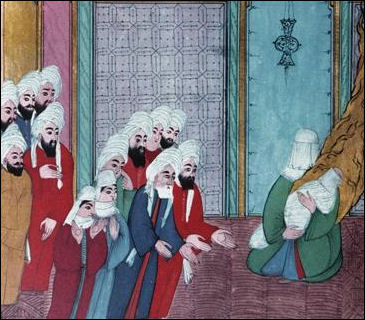
Muhammad and his wet nurse The treatment of and attitude towards women varies a great deal from place to place with Saudi Arabia, where women can’t drive and must be fully covered, and the Taliban, where girls are discouraged from attending school and stoned to death for committing adultery, representing the most conservative extreme. In many Muslim countries, such as Turkey, Malaysia, Bangladesh and Egypt, women can drive, vote and dress as they like. They can pursue professional careers and run for elected office and do most things that women in the West do.
Being an Arab woman is tough. They have to fight for what little rights the have. Mothers and motherhood are regarded as a foundation of society. Young married women are often dominated and pushed around by their mother’s in law. Women in urban areas generally have more freedom than those in rural areas.
Women are generally perceived as inferior and stupid by Saudi men. It not uncommon for young girls to be enlisted at an early age to assist in the making of bread and other food, and being punished if they nick any, while boys can help themselves to small bites whenever they feel like it. Within the woman’s world, there is a pecking order and social hierarchy based on age and status with older, high status women at the top. Mothers of married sons often wield considerable power over their daughter-in-laws.
Soheir Khashoggi told AP: “Contrary to what so many people think, strength,, energy and driver, these are very traditional for women in Arab culture. The Bedouin woman is very, very strong. She works in the fields, she moves in the desert.
Websites and Resources: Islam IslamOnline islamonline.net ; Institute for Social Policy and Understanding ispu.org; Islam.com islam.com ; Islamic City islamicity.com ; BBC article bbc.co.uk/religion/religions/islam ; University of Southern California Compendium of Muslim Texts web.archive.org ; Encyclopædia Britannica article on Islam britannica.com ; Islam at Project Gutenberg gutenberg.org ; Muslims: PBS Frontline documentary pbs.org frontline
RECOMMENDED BOOKS:
“A Muslim Woman's Diary” by Sumaya Amiri Amazon.com ;
“The Muslim Woman's Journal: A Book of Reflective Writing” by Kashmir Maryam Amazon.com ;
“The Muslim Woman's Manifesto” by Kashmir Maryam and Jane Ghazni Amazon.com ;
“Women and Gender in Islam” by Leila Ahmed Amazon.com ;
“Nine Parts of Desire: “The Hidden World of Islamic Women” by Geraldine Brooks Amazon.com ;
“Muslim Woman's Participation in Social Life” by Abd al-Halim Abu Shuqqah and Adil Salahi Amazon.com ;
“Women in Islam: What the Qur'an and Sunnah Say” by Abdur Raheem Kidwai Amazon.com ;
“Secrets Of Successful Muslim Wives: Muslima Coaching Wife Tips Series” by Naielah Ackbarali and Muslima Coaching Amazon.com
“Marriage in Islam: A short guide to basic Islamic marriage teachings plus tips for a healthy and happy marriage” by Layal Husni Amazon.com ;
“Handbook of a Healthy Muslim Marriage” by Abdur-Rahman ibn Yusuf Mangera Amazon.com ;
“Imaging Muslim Women in Indonesian Ramadan Soap Operas” by Rachmah Ida Amazon.com
Traditional View of Muslim Women
Views towards women in the Arab and Muslim world are arguably shaped more by Arab traditions of honor and tribal loyalty than Islam. Many of the anti-women position taken by Islamists are not based on the Qur’an and other Muslim scriptures and laws but rather are based on tribal customs in which individual rights are secondary to one’s position in the tribe or family and women are viewed as “communal or tribal property.” A girl’s value, for example, has traditionally been tied to her role in uniting one family with another through marriage.
George P. Monger wrote in “Marriage Customs of the World From Henna to Honeymoons”: “ The Qur’an states that men have authority over women and that Allah has made the one superior to the other because men “spend their wealth to maintain them.” The Qur’an further states that “good women are obedient. They guard their unseen parts because Allah has guarded them. As for those from whom you fear disobedience, admonish them and send them to beds apart and beat them. Then if they obey you take no further action against them.” In Arab countries it has been the practice to veil a girl at puberty and, according to Sharia law, to arrange her marriage soon after. But the Qur’an also states that marriage is a partnership to be shared between the man and the woman, based upon love, respect, and consent. Marriage is seen as a joining of two families, and parents have a great deal of say about the choice of marriage partner. [Source: “Marriage Customs of the World From Henna to Honeymoons”: “ by George P. Monger, 2004 ^]
Women are regarded as rulers of the home and are expected to make their home their first priority. Outside the home is world dominated by men who frown on women having too many freedoms. One woman told the Washington Post: “The worst thing you can do in the Arab world is ask for permission. It will always be no.”
Shazia Mirza, a Pakistani-British comedian said: “My family are very strict. Growing up, I was never allowed to do anything. I wanted to do ballet but I wasn’t allowed. I was never allowed on school trips and I was never allowed out."
Men and Women’s Rights in Islam — Equal But Not Identical
Throughout the Qur'an, people are referred to as "men and women" who are endowed with equal, though not identical, rights and obligations, based on their emotional, biological, and functional capabilities. In practice, this means that each has significant rights and responsibilities. To Muslims, it is unnatural for men and women to insist on or believe in performing identical tasks. The Prophet pointedly stated that "cursed are those men who imitate women, and those women who imitate men. " This does not mean that either one should be denied equal pay for equal work, nor should they be deprived of equal opportunities in the job market, education, services, and politics. By stating that "seeking knowledge is the duty of every Muslim man and woman," Islam has always urged both men and women to seek education. It allows women to have their own businesses, as exemplified by the Prophet's first wife, [Source: “Human Sexuality: An Encyclopedia”, Haeberle, Erwin J., Bullough, Vern L. and Bonnie Bullough, eds., sexarchive.info]
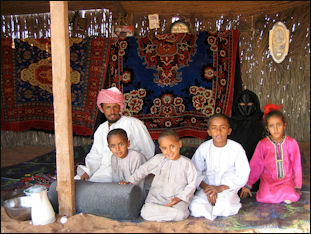
Bedouin family Equality of the sexes in Islam does not, also, entail the denial of natural, biological differences. Women, for example, are exempt from some of the basic rituals and obligations, such as prayer and fasting, during menstrual periods and pregnancy. With biological differences taken into account, it is important not to mix or confuse the functional duties of one sex with those of the other. "Wish not what God endowed the other with" is a standard saying in Islam. Marital relations should be compatible and complementary and not based simply on lust, beauty, wealth, or rivalry. To marry for the latter reasons is to invite humiliation, degradation, and eventual alienation.
Mohja Kahf, author of "The Girl with the Tangerine scarf", wrote in the Washington Post: “Blessings abound for me as a Muslim woman: the freshness of ablution is mine, and the daily meditation zone of five prayers that involve graceful, yoga-like movements, performed in prayer attire. ...The Quran doesn’t blame Eve. Literacy for women is highly encouraged by the traditions of the Prophet Muhammad. Breast-feeding is a woman’s choice and a means for her to create family ties independent of male lineage, as nursing creates legally recognized family relations under Islamic law. Rapists are punishable by death in Islamic law.” She also insists that birth control, masturbation and abortion are all allowed under some circumstances.
The theme of sexual equality lies at the heart of the Qur’an’s Adam and Eve story: “Oh mankind! Be conscious of your Lord, who created you out of one living entity, and from it created its mate, and from the two of them spread abroad the multitude of men and women.” One of the most quoted Islamic verses goes, “Paradise is at the feet of your mother.”
The right of women to work and make money is recognized in the Qur’an with the statement, “to men is allotted what they earn, and to women what they earn.” One verse of the Qur’an seems to imply that women can be leaders: “And the believers, both men and women — they are friends and protectors of one another; they enjoin the doing of what is right and forbid the doing of what is wrong.”
The aspects of Islam that are discriminatory towards women lie more in the fact the Qur’an and the Hadiths have been interpreted by men for 14 centuries than in the Qur’an and the Hadiths themselves.
Women as Wives in Islam
Heba G. Kotb wrote: The predominant idea in the teachings of Islam with regard to men and women is that a husband and wife should be full-fledged partners in making their home a happy and prosperous place, that they should be loyal and faithful to one another, and genuinely interested in each other's welfare and the welfare of their children. A woman is expected to exercise a humanizing influence over her husband and to soften the sternness inherent in his nature. A man is enjoined to educate the women in his care so that they cultivate the qualities in which they, by their very nature, excel. [Source: “Sexualiy in Islam” by Heba G. Kotb M.D., A dissertation presented to Maimonides University, 2004]
The Prophet's followers accepted his teachings and brought about a revolution in their social attitude towards women. They no longer considered women as mere chattels, but as an integral part of society. For the first time women were given the right to have a share in inheritance. In the new social climate, women rediscovered themselves and became highly active members of society rendering useful service during the wars which the pagan Arabs forced on the emerging Muslim world. They carried provisions for the soldiers, nursed them, and even fought alongside them if it was necessary. It became a common sight to see women helping their husbands in the fields, carrying on trade and business independently, and going out of their homes to satisfy their These aspects were much emphasized by the Prophet (peace be upon him). He exhorted men to marry women of piety and women to be faithful to their husbands and kind to their children. He said:
"Among my followers the best of men are those who are best to their wives, and the best of women are those who are best to their husbands. To each of such women is set down a reward equivalent to the reward of a thousand martyrs. Among my followers, again, the best of women are those who assist their husbands in their work, and love them dearly for everything, save what is a transgression of Allah's laws."
Once Mu'awiyah asked the Prophet (PBUH), "What are the rights that a wife has over her husband?"The Prophet replied, " Feed her when you take your food, give her clothes to wear when you wear clothes, refrain from giving her a slap on the face or abusing her, and do not separate from your wife, except within the house." Once a woman came to the Prophet with a complaint against her husband. He told her: "There is no woman who removes something to replace it in its proper place, with a view to tidying her husband's house, but that Allah sets it down as a virtue for her. Nor is there a man who walks with his wife hand-in-hand, but that Allah sets it down as a virtue for him; and if he puts his arm round her shoulder in love, his virtue is increased tenfold." Once he was heard praising the women of the tribe of Quraish, "...because they are the kindest to their children while they are infants and because they keep a careful watch over the belongings of their husbands."
Women’s Roles in Islam as Mothers and Widows
Heba G. Kotb wrote: Woman as a mother, commands great respect in Islam. The Noble Qur’an speaks of the rights of the mother in a number of verses. It enjoins Muslims to show respect to their mothers and serve them well even if they are still unbelievers. The Prophet states emphatically that the rights of the mother are paramount. Abu Hurairah reported that a man came to the Messenger of Allah (peace be upon him) and asked:"O Messenger of Allah, who is the person who has the greatest right on me with regards to kindness and attention?"He replied, "Your mother." "Then who?"Hereplied, "Your mother." "Then who?" He replied, "Your mother." "Then who?" He replied,"Your father." [Source: “Sexualiy in Islam” by Heba G. Kotb M.D., A dissertation presented to Maimonides University, 2004]
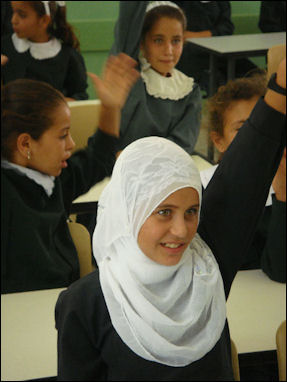
Gaza students In another tradition, the Prophet advised a believer not to join the war against the Quraish in defense of Islam, but to look after his mother, saying that his service to his mother would be a cause of his salvation. Mu'awiyah, the son of Jahimah, reported that Jahimah came to the Prophet (PBUH) and said, " Messenger of Allah! I want to join the fighting (in the path of Allah) and I have come to seek your advice."He said, "Then remain in your mother's service, because Paradise is under her feet."
The worst calamity for a woman is when her husband passes away and, as a widow, the responsibility of maintaining the children falls upon her. In the Eastern World, where a woman does not always go out to earn her living, the problems of widowhood are indescribable. The Prophet Muhammad (peace be upon him) upheld the cause of widows. Most of his wives were widows. In an age when widows were rarely permitted to remarry, the Prophet encouraged his followers to marry them. He was always ready to help widows and exhorted his followers to do the same. Abu Hurairah (ONE OF THE SINCEREST FOLLOWERS) reported that the Prophet said:"One who makes efforts (to help) the widow or a poor person is like a mujahid (warrior) in the path of Allah, or like one who stands up for prayers in the night and fasts in the day."
Muslim Women and Education
Literacy for women is highly encouraged by the traditions of the Prophet Muhammad. Prestigious Al-Azhar University in Cairo has a woman’s college. There are some girl’s madrasahs and other means for females study within Islamic institutions. But in many cases educational opportunities that are offered to males are denied to females, especially under repressive regime like the Taliban. Nearly all religious scholars and interpreters of Islamic law are men. [Source: Carla Power, New York Times magazine, February 25, 2007]
But that wasn’t always the case. Muhammad Akram Nadwi, a Sunni religious scholar, began work in the 1990s on a dictionary of female hadith scholars. When he started he thought he would be lucky to fill a single volume with a few dozen entries but he found many more female scholars than he thought he would. As of 2007, he had 8,000 biographical entries in his 40-volume dictionary.
The entries include a 10th- century Baghdad-born jurist who traveled to Syria and Egypt preaching to women; a 12th-century Egyptian scholar who impressed her male students with her knowledge of a “camel load” of texts; and a 15th-century woman who taught law at the Prophet’s grave in Medina. A 7th-century female jurist from Medina issued fatwas on how the hajj should be carried out. A jurist from Aleppo advised her husband, a famous scholar, how to issue his fatwas. Ummal-darda, a prominent 7th-century scholar from Damascus enjoyed sitting around with men debating religious issues and appears to have been treated as an equal by male scholars. She lectured men and counted a caliph among her students.
After the 16th century the number of women scholars declined markedly as Islamic scholarship and jurisprudence became more formal and oriented towards creating careers in courts and mosques. That appears to have made the female scholars that were around work harder so they could be taken seriously. Akam said the erosion of educational opportunities for Muslim women reflected a “decline in every aspect of Islam” — primarily the result of poor leadership that has let extremism gain too much control and left the Muslim community ignorant and confused.
Women and Conservative Islam
Judaism, Christianity and Islam have all have rules and ideologies constructed by men to keep women down. In many Muslim sects and groups, women are considered the property of male relatives and they need permission of a male relatives to marry, name their children or work. In the Wahhabist interpretation of Sharia, a “muhrim” — father, husband, brother or son — must accompany women in public, give them permission to travel and attest their legal contracts.
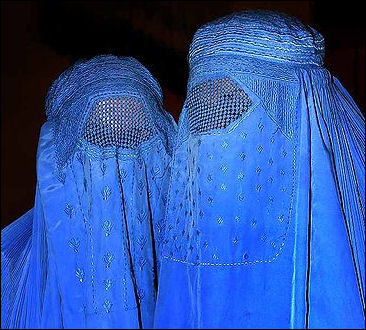
Burqa in Afghanistan Conservative Muslims insist that women distract men, tempt to them to fornication and cause them ascribe blasphemous divine qualities to women. Some Muslims believe that women should obey their husbands as if they were gods. In some cultures it is perfectly acceptable for men to beat, burn or imprison their wives without food for "disobedience."
One Arab man told the Los Angeles Times, “It is true that we view our women as commercial assets to be bought and sold.” The feminist Egyptian writer Salwa Bakr, told AP, "A woman in Arab societies is an object for sex and reproduction. As long as she is an object, she is owned by a father, a husband a brother. They way she uses her body is not her business, the business of those who won her."
Some conservative Muslim claim conservative Islamist views towards women are ultimately based on respect and love for them. A 32-year-old female religious student in Iran told the New York Times, “We think a woman in Islam is a tender creature, a rose flower. And you should pay more attention to your roses than any other flower. The restrictions for women exist because Islam respects women.” The execution of adulterous men and women is sometimes held up as proof that women are held in high esteem.
Some Muslim women embrace conservative Islam. They willingly comply with veiling and segregation from men and other restrictions made on them. Some are active in jihadi movements and have participated in suicide bombing missions. An Internet magazine for female jihadis, called Al-Khansaa tells mothers their “main mission is to present lions on a battlefield” and offer advise on raising children to fight infidels and become martyrs.”
Book: "Infidel" by Ayaan Hirsi Ali is about a woman growing up under harsh conditions in Muslim Somalia, Saudi Arabia and east Africa.
Women in Saudi Arabia
Women are arguably more oppressed in Saudi Arabia than they are in any other Muslim country. Since they are excluded from the world of men, Saudi Arabian women live in their world they have created indoors for themselves in which only women and children participate. Urban women have frequent get-togethers and parties in someone’ home. They attend exercise classes and other activities for women only. Many of their duties are taken care of by servants. [Source: Marianne Alireza, National Geographic, October 1987]
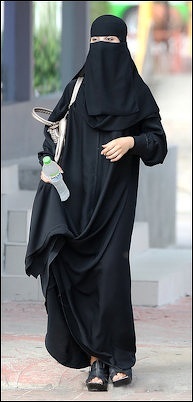
woman in niqab in Saudi Arabia
Women are expected to make their home their first priority. They are generally perceived as inferior and stupid by Saudi men. Within woman’s society, there is a pecking order and social hierarchy based on age and status with high status women at the top. Mothers of married sons often wield considerable power over their daughter-in-laws.
For a long time women were not even issued ID cards. The only proof a woman had of her existence was her name on her husband’s or father’s card or that of some other male relative. An effort to grant women ID cards was thwarted by religious authorities.
Women, Family and Honor
In many Muslim societies purity and chastity before marriage are considered imperative. From an early age girls learn about “ eib” (shame) and “ sharaf” (honor). They are taught to dress modestly, lower their eyes when in public and above all else to remain a virgin until they are married. Honor is linked to a woman’s purity and based on the fact she is weak and needs a man’s protection. In some societies, rape and being raped is regarded as worse than murder. Any affront on a woman’s honor is something that must be avenged.
Women are guarded and secluded because if they do anything regarded as unchaste or impure it dishonors their entire family. Female chastity and the appearance of chastity lie at the foundation of the Arab code of honor and the codes of honor of other cultures that embrace Islam.
The Muslim extremist belief seems to be that the honor of women is upheld by imprisoning them. The “protecting” is done by fathers, brothers and husbands. Explaining how honor works, a feminist Turkish lawyer told the Los Angeles Times, “It is a virtue that only a man can possess and that can only be soiled by a female body. It is a notion that was concocted by men to ensure their continued domination over tribe and society long before Islam was ever introduced.”
In families where honor is held at a premium, brothers follow their sisters around like private detectives, on the lookout for any questionable behavior. A French woman born to Algerian parents told the International Herald Tribune: “Until I was 17 my older brother hit me”for being in the street, or for visiting friends, or for wearing makeup, all the normal things French girls did. For a long time I tried to keep my head down, like all the other submissive women hidden in their homes.”
A lawyer explained how honor affects all the women in a family. “A stained reputation means that other unmarried girls in the family will never find suitors until it is cleansed,” she said. “If a woman has no skills, no education, her honor is her only currency in the marriage market.” Many girls are told the story of a girl who killed herself after she was raped so as not to stain her family’s honor. For this she was buried in gold. By contrast, girls who bring shame to their families are buried unceremoniously in unmarked graves.
Women and Sharia
Sharia is a broad set of ethical principles rooted in the Qur’an and teachings of Muhammad and commonly translated as Islamic law. It grants women the rights of property, divorce, inheritance, child custody, alimony, education, choosing a husband, divorce, working, engaging in business and entering a profession. Islam also recognizes the right of women to enjoy sex in their marriage and make decisions about contraceptives and family size. Even in conservative Saudi Arabia women are allowed to run businesses, donate land for schools and endow trusts.
Dr. Heba G. Kotb wrote: The Shari'ah regards women as the spiritual and intellectual equals of men. The main distinction it makes between them is in the physical realm based on the equitable principle of fair division of labor. It allots the more strenuous work to the man and makes him responsible for the maintenance of the family. It allots the work of managing the home and the upbringing and training of children to the woman, work which has the greatest importance in the task of building a healthy and prosperous society. [Source: “Sexualiy in Islam” by Heba G. Kotb M.D., A dissertation presented to Maimonides University, 2004]
It is a fact, however, that sound administration within the domestic field is impossible without a unified policy. For this reason the Shari'ah requires a man, as head of the family, to consult with his family and then to have the final say in decisions concerning it. In doing so he must not abuse his prerogative to cause any injury to his wife. Any transgression of this principle involves for him the risk of losing the favor of Allah, because his wife is not his subordinate but she is, to use the words of the Prophet (PBUH), 'the queen of her house',and this is the position a true believer is expected to give his wife. In contrast to these enlightened teachings of Islam in respect of women, Western talk of women's liberation or emancipation is actually a disguised form of exploitation of her body, deprivation of her honor, and degradation of her soul!
See Separate Articles: See Marriage Contract Under MUSLIM WEDDING: CONTRACT, DOWRY, ENGAGEMENT, PARTY africame.factsanddetails.com and MUSLIM MARRIAGE: LAWS, CUSTOMS, TRADITIONS africame.factsanddetails.com ; MUSLIM DIVORCE africame.factsanddetails.com ;
Negative Side of Sharia and Women
Sharia is often portrayed as particularly regressive and backwards in regard to women’s rights. For many of legal rights listed above, women need permission of a man. According to Muslim law, every girl and woman has a guardian — her father, brother, or some male relative — and he makes major decisions about her life. Marriage contracts, for example, are worked out by him and the groom’s family and the woman has no say in the matter and must follow the wishes of her guardian.
The views towards women are often conveyed as being protective of women and serving their own interests rather than being discriminatory. Where honor or kin group is concerned Muslim law is often protective of women, for example, providing the widest possible limits within which the legitimacy of children born in wedlock are recognized.
Professor Mark Fathi Massoud wrote:Part of the problem with the often brutal interpretation of Sharia has been that men have been aligning it with their political views. “The custodians of law are men,” an aid worker told me. Indeed, some religious leaders insist that Sharia allows child marriage and female genital mutilation to preserve women’s premarital virginity and prevent women from experiencing sexual pleasure. [Source: Mark Fathi Massoud, Professor of Politics and Legal Studies, University of California, Santa Cruz, The Conversation, August 15, 2021]
Women in Muslim Courts
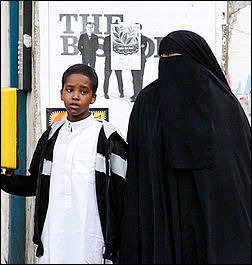
Burqa in England Questions about Muslim laws that affect women have traditionally been decided by male clerics. But in some there are women “muftias”, overseen by male muftis. One such group ruled that a husband is not obliged to pay his wife’s travel expenses if she goes to her parents house without her permission and that trimming one’s nails during menstruation is not advisable and decided that the question of whether high heels are allowable required more thought an analysis.
According to Muslim law males and a women’s testimony in court, at least on financial matters, hold’s half the weight of a man’s testimony. Women have traditionally been barred from courtrooms and had to testify through a special window.
According to Muslim law males receive twice as much in inheritance as females. Under the current system daughters inherit half of what sons gets and if a daughters only the only heir a proportion of the money goes to male relatives not the daughters because according to Islamic tradition men are responsible for taking care of their female relatives. Muslim law also says the blood money for a woman is half that of a man.
Laws Regarding Women in Arab Countries
Arab countries apply Islamic law rules to inheritance matters and domestic relations. In some instances the laws don’t necessarily align with those of Islam.Many Arab countries set the minimum age for women to marry at 18 years of age. Nevertheless, those countries have a provision in their family law allowing a religious court to grant women younger than 18 the right to marry. However, Yemen has abolished its minimum age for marriage. [Source: Library of Congress Law Library, Legal Legal Reports, 2020 |*|]
Most Arab countries include a provision in their constitutions promoting the principle of gender equality. Some countries, such as Kuwait, Jordan, and the UAE, however, do not include the term “gender” in the equality provision. Many Arab countries have adopted legislation to combat the problem of domestic violence. However, countries such as Egypt, Qatar, Oman, and Yemen lack anti-domestic violence laws.
Most of the constitutions of Arab countries include a provision promoting the principle of gender equality. However, some countries, such as Kuwait, Jordan, and the UAE do not include the term ”gender” in the equality provision. This reference to gender is also lacking in the basic law of Saudi Arabia. Instead, the country’s basic law of 1992 links the principle of equality to the standards of Islamic law, which limits the rights of females with regard to inheritance shares. The Constitution of Iran references “equal rights and protection under the law” for men and women, but the rights it affords are circumscribed by the requirement that they “conform to Islamic criteria” that themselves do not give women equal status with men. |*|
Many Arab countries have adopted legislation to combat the problem of domestic violence. However, countries such as Egypt, Qatar, Oman, and Yemen lack anti-domestic violence laws. In addition, some of the anti-domestic violence legislation of Arab countries, including Morocco, Jordan, and Lebanon, do not criminalize marital rape. Iran currently has no law aimed at preventing domestic violence and protecting women victims of violence, and a bill currently under consideration does not adequately address these issues. The Family Violence Prevention Law, 1991-5751 of the State of Israel, authorizes courts and religious tribunals to issue protective orders, order participation in treatment plans, and order the confiscation of weapons, in accordance with the requirements established by the Law. |*|
For the complete article from which the material here is derived see Legal Provisions on Gender Equality from the Library of Congress Legal Library tile.loc.gov
Image Sources: Wikimedia Commons except driving woman, DMV.org
Text Sources: Internet Islamic History Sourcebook: sourcebooks.fordham.edu ; Arab News, Jeddah; “Islam, a Short History” by Karen Armstrong; “A History of the Arab Peoples” by Albert Hourani (Faber and Faber, 1991); “World Religions” edited by Geoffrey Parrinder (Facts on File Publications, New York); “Encyclopedia of the World’s Religions” edited by R.C. Zaehner (Barnes & Noble Books, 1959); Metropolitan Museum of Art, Encyclopedia.com, National Geographic, BBC, New York Times, Washington Post, Los Angeles Times, Smithsonian magazine, The Guardian, Al Jazeera, The New Yorker, Time, Newsweek, Reuters, Associated Press, AFP, Library of Congress and various books and other publications.
Last updated April 2024
